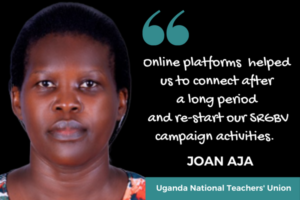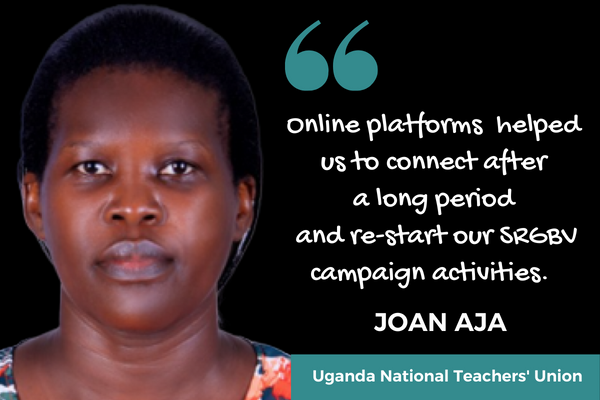Education unions in Africa engage in various actions to address violence in schools. Unions create awareness and change practices in schools and their organisations. They lead policy reform and confront the institutional norms that perpetuate School-Related Gender-Based Violence (SRGBV).
Unequal power relations drive SRGBV: the systemic power of men over women; positional power of headmasters over young women teachers; authoritative power of teachers over learners. The LRS supports teachers’ unions that recognise the potential of transformative approaches for ending SRGBV. Unions have found creative and sustainable ways to mobilise resources for transformative campaigns.
In the midst of the covid-19 in 2021, the unions asked themselves: What will it take to use online approaches for strengthening the work of addressing SRGBV, but in the context of covid? The answer was to equip campaign coordinators with information and the skills for designing and facilitating online meetings.
Joan Aja, Gender and Resource Mobilisation Officer at Uganda National Teachers’ Union, is among the coordinators inspired by the LRS to organise webinars and restart the SRGBV campaign work.
In this interview, Joan speaks about:
- Having the skills to design, plan and lead online discussions.
- Providing inclusive storytelling spaces to contribute to the rebuilding of safe schools.
- Knowing the opportunities and challenges presented by online meetings and online communication platforms.
- Her activism journey against school-related gender-based violence.

After being disconnected from the work due to covid, how did the webinars help teams to regroup?
Covid worsened the conditions that are responsible for gendered violence in school communities. Because of the extended closure of schools in Uganda, we feared our gains would erode and children and workers re-traumatised.
We organised online meetings that brought together people who were isolated (physically and information-wise) for almost two years. People were excited to attend and share their experiences about the pandemic, how the SRGBV work was affected, and how the learners were experiencing the extended school closures. Teachers recognised that the children would need more support and protection when schools reopened.
We got empowered by the LRS webinars on designing and facilitating online meetings. The webinar facilitators were very patient, and everyone felt included and supported to learn.
How did you benefit from the training?
I have improved my leadership and the confidence to organise online meetings for participants in different regions. I can lead more people to connect online and share their experiences and aspirations about our work in the context of covid. I have also improved my skills in preparing presentations.
What inspired your activism against SRGBV?
I stumbled on the topic of school-related gender-based violence in 2019 at INSET, the teachers’ professional development programme. My programme orientation task was to present on SRGBV. My research showed the magnitude of SRGBV and inspired me to know more.
The Uganda National Teachers’ Union (UNATU), which I joined three years ago, has mainstreamed SRGBV activities into school-based programmes, including the INSET.
The union and the ministry of education have many resources and materials on SRGBV, how it affects learning and what we can do to stop it. I used the available resources to continue to learn under the mentorship of my INSET training supervisor. I would later represent UNATU at all SRGBV-related meetings at the education ministry. Together with the ministry officials, we reviewed many working documents and I enhanced my knowledge.
SRGBV is prevalent despite the government’s ban on corporal punishment in 1997. The boys, girls, teachers and support staff report having experienced violence in schools.
How did you share knowledge and advocate against SRGBV at the workplace level?
Alongside the INSET are several other interventions, including the women’s empowerment training programme, which I joined. I spoke on SRGBV and gave resources to the teachers at the women’s empowerment programme. The teachers got a space to speak about their experiences with SRGBV. They were excited to talk with me afterwards and give feedback, which helped improve my presentations. But some teachers who were perpetrators kept their distance because they feared I would report them to the authorities. Still, I got many teachers to commit to creating awareness and ending SRGBV.
One teacher who felt responsible for stifling a boy’s talent and then causing him to drop out of school said: “Madam, from today, I will never beat a child.” Despite the appreciation that everyone has a role in ending SRGBV, it is not obvious to every teacher that actions start with them. So, we create awareness about how the individual learner is affected by SRGBV. The teacher must go beyond the prepared content and know what the child is going through to give the most suitable support.
Learners can become active agents in ending SRGBV if they can recognise abuse, understand their rights and know who to talk to if they witness or experience abuse. How have you steered learner awareness and activism?
Teachers can empower learners to prevent violence and abuse. When I gave an SRGBV booklet to my son to read and share at his school, little did I know the impact it would have!
The booklet (a ministry of education resource) addresses corporal punishment and encourages speaking out, documenting and referring of incidences. I put a clean page at the back of the booklet and told my son to record the names of every person who read it. All his classmates read the booklet!
The children learned how to report abuse and about the ban on corporal punishment. Consequently, my son’s friend hid the caning stick used by the class teacher. The teacher found out about the booklet that was now changing hands across the school. The teachers read it, too.
Children’s drawings were among the various tools used to depict SRGBV during a past national conference on ending SRGBV. I attended the conference and watched a poignant video of a girl who experienced abuse from her teacher. The girl was old for her grade, and the teacher would attack her. She later became a bar waitress. She said: “Maybe if I had persisted even with the beatings, I would have succeeded. But I have forgiven the teacher.” The teacher apologised to her.







